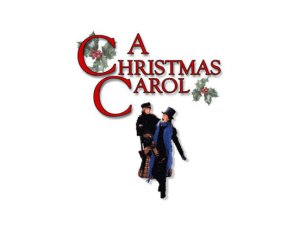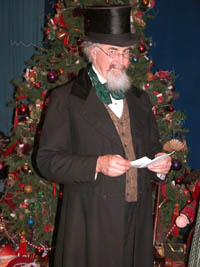Think fast:
- Who said, “God bless us, every one!”?
- Who is Jacob Marley?
If you can answer these questions effortlessly, then you too have been affected by the wide-reaching legacy of Charles Dickens’ 1843 A Christmas Carol. (See a tribute to the author’s influence here).
What does the Ghost of Christmas Present look like? is a much harder question. The answer depends on your source. Do you identify with the green-garbed, larger-than-life, milk of human kindness-drinking man from the Albert Finney musical Scrooge? Or has another picture been imprinted in your mind?
 Among the famous actors who have taken on the role of Scrooge are…
Among the famous actors who have taken on the role of Scrooge are…
- Patrick Stewart (1999 A Christmas Carol)
- Albert Finney (1970 Scrooge)
- George C. Scott (1984 A Christmas Carol)
- Alistair Sim (1971 A Christmas Carol)
- Michael Caine (1992 The Muppet Christmas Carol)
A full list of related movies is available from the Internet Movie Database. Themes from A Christmas Carol have appeared in scores of television shows, spinoffs, and spoofs.
Around Christmas time, not only do productions of A Christmas Carol on stage pop up overnight and films of Scrooge and A Christmas Carol (or A Carol Christmas) fill the television networks, but allusions to Dickens’ little book begin to emerge in other areas of popular culture, testimony to the lasting impact of a piece of literature.
“God bless us, every one.”
Tiny Tim’s famous phrase has made him a poster child for charitable organizations during the holidays. His name and motto have also been used to represent a spirit of religious universalism or just plain feel-good holiday spirit.
The word “scrooge” has become a synonym for a grumpy, uncharitable person who lacks Christmas spirit or compassion. It is used in as diverse situations as recommendations for thrifty shopping, discussions on religion and the holidays, and a contest celebrating the individual with the least Christmas spirit.
Of course, Ebenezer Scrooge’s favorite expression, “Bah Humbug,” has become similarly famous. It has appeared in articles about holiday season depression (not a laughing matter by any means), expensive tires, and child safety.
And the list could go on…
One small newspaper points out that the Victorian era, when A Christmas Carol was written, is the time period in which many of our modern Christmas traditions were born. So maybe the fact that holiday celebrants of all ages, regions, and eras have turned to Dickens to find the spirit of Christmas is not so bizarre after all.
*For more usages of A Christmas Carol, try your own Google search!


You must be logged in to post a comment.